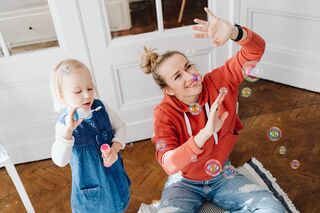Motivation
Playtime: Shouldn't This Be Fun?
How to let go of control and unleash your inner child.
Posted April 4, 2022 Reviewed by Davia Sills
Key points
- Recognize a key cognitive difference that informs how adults and children approach playtime.
- Learn how control can sabotage the opportunity for bonding.
- Reimagine playtime through a child's perspective to get the most benefits from it.

Playing with your kids seems easy enough, right? Or maybe not. If you're a parent like me, you are probably trying to maximize every precious moment with your kids. Teach them. Role model. Reinforce. Give positive attention, but don't overdo it. Cultivate grit. Grow their motivation. Don't be too harsh, but just firm enough.
Whoa... this is a lot to jam into your precious time with your kids. And honestly, it can be a pressure cooker. Family life is busy, and parents love a two-for-one. But it can also lead to an unreachable set of expectations that leaves us feeling depleted and full of unnecessary guilt.
Playtime has become one of those things that got overcomplicated for parents. We're burdening ourselves by trying to accomplish too many things in one fell swoop.
Playtime pitfall—taking it too seriously.
In our endless pursuit to parent our kids, we can unknowingly approach playtime too seriously. We flip the script, and instead of being playful, flexible, and light-hearted, we become serious, rigid, and unimaginative. Here's what I mean. Imagine you take out Jenga and start playing the game with your 4-year-old. The game is going well, he's cooperatively taking turns with you, and you're enjoying the experience. You're thinking: My kid is awesome!
A few minutes later, he abruptly punches the tower with his fist and yells, "Hulk-smash!" Stunned by his outburst, you yell at him for ruining the game and declare that playtime is over. Your son fell off his imaginary pedestal in your mind, and now you're thinking: My kid sucks. Trust me, we've all been there. But guess what? It's not technically your fault. It's how you're wired.
Acknowledging the invisible saboteur.
As adults, we like to know what happens next. Control feels good. However, we're cognitively mismatched during playtime because children haven't yet developed that part of their brain. They don't have a specific plan for the experience or a clear definition of success other than having fun.
Kickstart your inner child by getting on their level. Abandon your narrow and strict definitions of how playtime should unfold (we have to take turns). Let go of specific goals that block your ability to be flexible (we must play the game to completion according to the rules provided by the manufacturer). And allow your child to change up the experience by going along as he leads, rather than allowing your cognitive differences to sabotage the opportunity for bonding and laughter.
Playtime reimagined—let your child lead.
In the Jenga example, look at the game as a mere starting point, not the destination. From this new point of view, you are dissolving the need for control. Success is no longer dependent upon controlling the experience end-to-end. Nothing is predetermined. You are free to embrace your child's way of playing, liberating both of you from the limiting nature of control that often hi-jacks the fun.
Now, let's go back to our playtime example. How could you imagine responding differently after your son punches the Jenga tower? Maybe you declare a Marvel-themed war and engage him in a romp on the carpet where he (Hulk) defeats you (the bad guy) and saves the planet from inevitable doom? Or maybe you both rebuild the tower so he can show you his full arsenal of Hulk-style smashing capabilities? Or…?
My guess is that your imagination showed you these alternative endings, and they are quite different from the original. Hopefully, they're full of laughter, smiling, and the desire to do it again and again.
Now that you've seen your options, you can't unsee them!
So, does it really matter that the Jenga tower wasn't played with according to the rules? Who cares if the game was abandoned, and now playtime is spent rough-housing? Remember... the goal is to have fun. The possibilities for playtime are limitless if you allow them to be.
If you can give yourself permission to release your need to control and instead let your child's imagination take the lead during playtime, you've successfully unleashed your inner child. Enjoy it!




